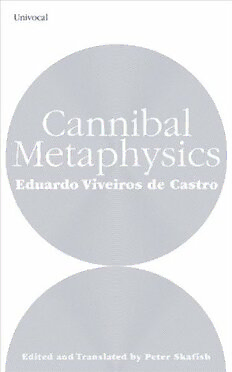
Cannibal Metaphysics PDF
Preview Cannibal Metaphysics
CANNIBAL METAPHYSICS FOR A POST-STRUCTURAL ANTHROPOLOGY EDUARDO VIVEIROS DE CASTRO translated and edited by Peter Skajish Metaphysiques cannibales by Eduardo Viveiros de Casrro © Presses Universiraires de France, 2009 Translared by Perer Skafish as Cannibal Metaphysics Firsr Edition Minneapolis© 2014, Univocal Publishing Published by Univocal 123 Norrh 3rd Streer, #202 Minneapolis, MN 55401 No part ofr his book may be reproduced or rransmirred in any form or by any means, elecrronic or mechanical, including photocopying, recording or any other information storage or retrieval system, without prior permission in writing from the publisher. Designed & Printed by Jason Wagner Distributed by the Universiry of Minnesota Press ISBN 9781937561215 Library ofC ongress Control Number 2014952937 Acknowledgments The argument of this book has been nourished by research pre sented in the following publications that have since been adapt ed, revised, and considerably re-worked and developed during the course of the book's editorial revisions. 1. "Perspectivismo e multinaturalismo na America idigena," in E. Viveiros de Castro, A inconscancia da alma selvage, Sao Paulo, CosacNaify, 2002 (p. 347-399). 2. "And," Manchester Papers in Social Anthropology, 7, 2003. 3. "Perspectival anthropology and the method of controlled equivo cation," Tipiti (Journal of the Society for the Anthropology of low land South America), 2 (1), 2004, p. 3-22. 4. "Filiayfo intensiva e alianya demoniaca," Novos Escudos Cebrap, 77,2007, p. 91-126. 5. "Xamanismo transversal: Levi-Strauss eac osmopolftica amazoni ca'' in R. Caixeta de Queiroz and R. Freire Nobre, Levi-Strauss: lei turas brasileiras, Belo Horizonte, Editora UFMG, 2008 (p. 79-124) Numerous people have contributed to the realization of these writings. Most of them appear in the bibliography of this pres ent work. Nevertheless, I would like to mention the names of Tania Stolze Lima, Marcio Goldman, Oiara Bonilla, Martin Hol braad, Peter Gow, Deborah Danowski, Marilyn Strathern, Bruno Latour, Marshall Sahlins, Casper Jensen, Philippe Descola and Anne-Christine Taylor, who should be thanked for having, each in their own way, caused, inspired, supported, translated, cri tiqued, or in one way or another, improved the ideas put forward in this book. A first version of this book was presented for the occasion of a series of conferences that took place at 1.:Institut d' etudes avancees de Paris (Maison Suger) in January 2009. I want to thank Yves Duroux and Claude Imbert for their generous invitation, the warm welcome, and the stimulating work environment they pro cured for me during those winter weeks. Last, but certainly not least, I would like to thank Patrice Maniglier who made this book possible by inviting me to take it on as a project and for providing the ideal context in which to publish it as well as for (literally!) making me write it. But more than anything else, I owe him grat itude for his own writings whose themes are quite close to mine and which inspired me to write this book simply by the fact that I had learned something new. Table of Contents lntroduction 9 ........................................................................................ by Peter Ska.fish PART ONE Anti-Narcissus 1. A Remarkable Reversal... ................................................................ 39 2. Perspectivism . 49 ................................................................................ 3. Multinaturalism 65 ............................................................................. 4. Images of Savage Thought . . 77 ............................................................ PART TWO Capitalism and Schizophrenia from an Anthropological Point of View 5. A Curious Chiasm .........................................................................9 7 6. An Anti-Sociology of Multiplicities 107 ............................................. 7. Everything is Production: Intensive Filiation 123 ............................... PART THREE Demonic Alliance 8. The Metaphysics of Predation 139 ...................................................... 9. Transversal Shamanism . 151 ............................................................... 10. Production Is Not Everything: Becomings 159 ................................. 11. The System's Intensive Conditions ............................................. 173 PART FOUR The Cannibal Cogito 12. The Enemy in the Concept 187 ........................................................ 13. Becomings of Structuralism ....................................................... 197 Bibliography 221 ..................................................................................... Introduction Can anthropology be philosophy? Can it not just contribute to but do, and even aid in reinventing philosophy, in the sense of constructive, speculative metaphysics? And what, in that event, would philosophy be, since most of its best instances begin, end with, and never abandon Western categories? Such questions might be lamely disciplinary were it not for the symmetrically unimaginative, joint response they still receive. For the philoso phers, things are often quite simple: anthropology is a source of empirical specifications or exemplifications of matters conceived more universally by themselves, but only rarely does it accede to such a broad level of reflection. The anthropologists, surprisingly, do not exactly balk at the put-down, the large part of them on account of a commitment to examining "reality" in its singularity and particularity (which is to say, out of not just a concern with the concrete but the presumption that intellectual and ethical re sponsibility is incompatible with posing big questions) and its "theoretical" wing out of recognition that few people claiming the mantle of philosophy prove sufficiently adept at critique to not end up treating modern liberal ideological values as profound truths, or misconstruing the most simple actualities in their re flections on them. Although both views might have once characterized actual ly existing research, too much has happened since to leave them perspicacious, and what has been called the "theoretical bomb" of Eduardo Viveiros de Castro's Cannibal Metaphysics will likely leave them a complete shambles. 1 Leaving aside the fact that a I. The characterization is Latour's. See his "Perspectivism: Type or Bomb," Anthropology Today, guest editorial, April 2009, vol. 25, no. 2, pp. 21-22. which summarizes the public 9
